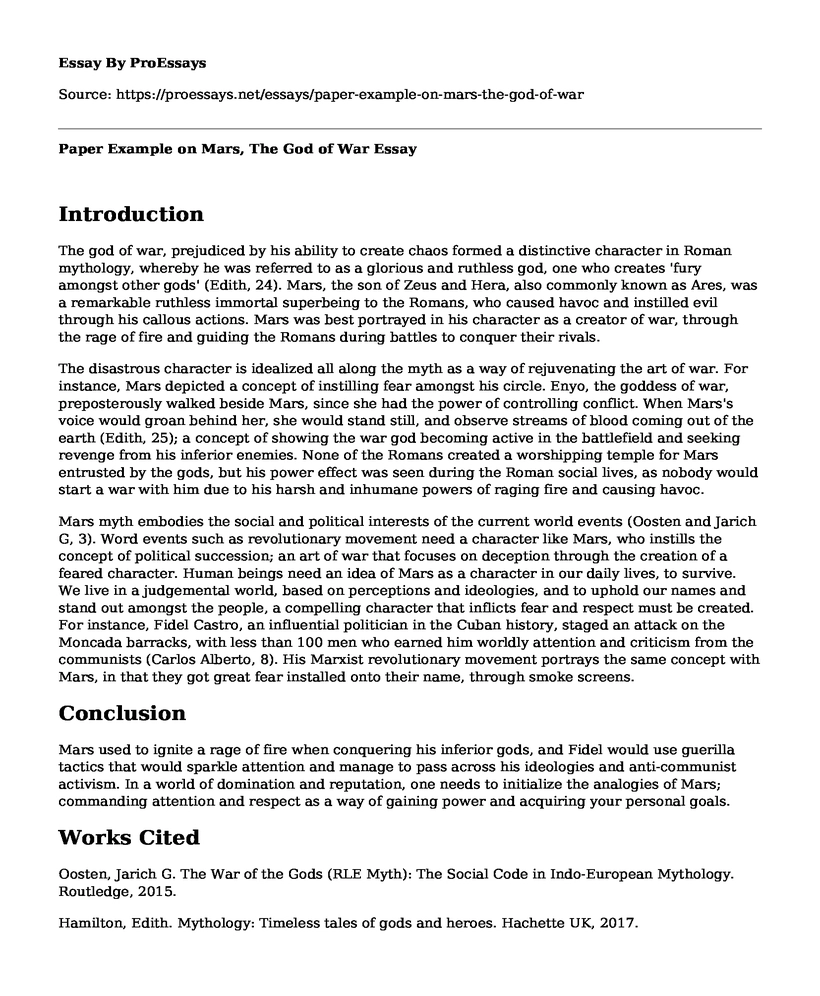Introduction
The god of war, prejudiced by his ability to create chaos formed a distinctive character in Roman mythology, whereby he was referred to as a glorious and ruthless god, one who creates 'fury amongst other gods' (Edith, 24). Mars, the son of Zeus and Hera, also commonly known as Ares, was a remarkable ruthless immortal superbeing to the Romans, who caused havoc and instilled evil through his callous actions. Mars was best portrayed in his character as a creator of war, through the rage of fire and guiding the Romans during battles to conquer their rivals.
The disastrous character is idealized all along the myth as a way of rejuvenating the art of war. For instance, Mars depicted a concept of instilling fear amongst his circle. Enyo, the goddess of war, preposterously walked beside Mars, since she had the power of controlling conflict. When Mars's voice would groan behind her, she would stand still, and observe streams of blood coming out of the earth (Edith, 25); a concept of showing the war god becoming active in the battlefield and seeking revenge from his inferior enemies. None of the Romans created a worshipping temple for Mars entrusted by the gods, but his power effect was seen during the Roman social lives, as nobody would start a war with him due to his harsh and inhumane powers of raging fire and causing havoc.
Mars myth embodies the social and political interests of the current world events (Oosten and Jarich G, 3). Word events such as revolutionary movement need a character like Mars, who instills the concept of political succession; an art of war that focuses on deception through the creation of a feared character. Human beings need an idea of Mars as a character in our daily lives, to survive. We live in a judgemental world, based on perceptions and ideologies, and to uphold our names and stand out amongst the people, a compelling character that inflicts fear and respect must be created. For instance, Fidel Castro, an influential politician in the Cuban history, staged an attack on the Moncada barracks, with less than 100 men who earned him worldly attention and criticism from the communists (Carlos Alberto, 8). His Marxist revolutionary movement portrays the same concept with Mars, in that they got great fear installed onto their name, through smoke screens.
Conclusion
Mars used to ignite a rage of fire when conquering his inferior gods, and Fidel would use guerilla tactics that would sparkle attention and manage to pass across his ideologies and anti-communist activism. In a world of domination and reputation, one needs to initialize the analogies of Mars; commanding attention and respect as a way of gaining power and acquiring your personal goals.
Works Cited
Oosten, Jarich G. The War of the Gods (RLE Myth): The Social Code in Indo-European Mythology. Routledge, 2015.
Hamilton, Edith. Mythology: Timeless tales of gods and heroes. Hachette UK, 2017.
Montaner, Carlos Alberto. Fidel Castro and the Cuban Revolution: Age, Position, Character, Destiny, Personality, and Ambition. Routledge, 2017.
Cite this page
Paper Example on Mars, The God of War. (2022, Jun 30). Retrieved from https://proessays.net/essays/paper-example-on-mars-the-god-of-war
If you are the original author of this essay and no longer wish to have it published on the ProEssays website, please click below to request its removal:
- How Chaucer's General Prologue Introduces the Canterbury Tales: Essay Example
- Research Paper on Jealousy and Manipulation in William Shakespeare's Othello
- Don Quixote by Miguel De Cervantes Essay Example
- Ann Bradstreet Poem "To My Dear and Loving Husband" Essay
- Male Friendship According to Tobias Wolff Essay Example
- Essay Sample on Love & Obedience in 1984: Winston & Julia's Rebellion Against the Party
- Critical Essay Sample on "I Felt a Funeral, in my Brain": Emily Dickinson's Unique Style







